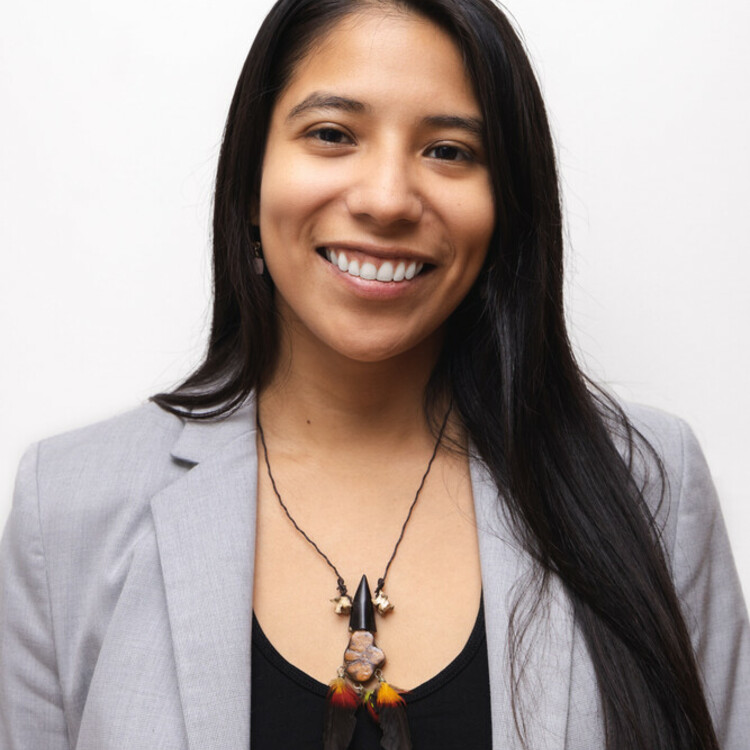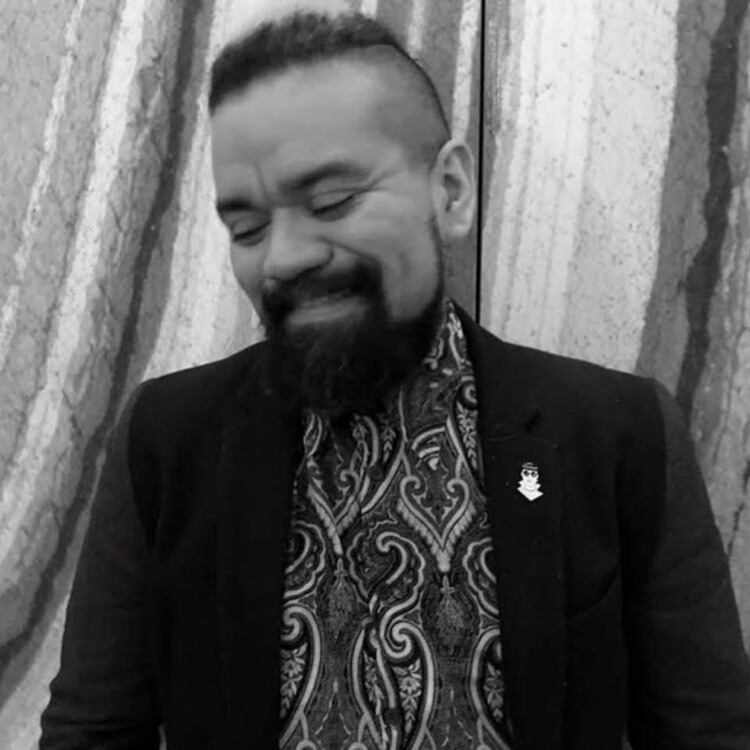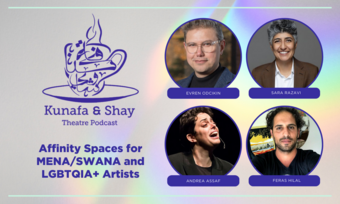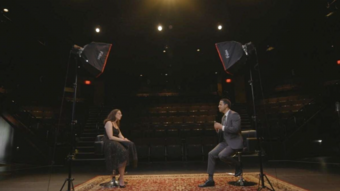Use Your Voice with Jose Solís
Jose Solís: That’s the beauty of the internet sometimes. I know it can be hell, but it can also be a place where beautiful connections can happen.
Yura Sapi: Welcome to season three. Welcome to our liberation. Welcome to the Building Our Own Tables podcast.
The Building Our Own Tables podcast is produced for HowlRound Theatre Commons, a free and open platform for theatremakers worldwide. This is Yura Sapi, here to support you on your journey of creation towards our collective liberation. How exciting is it to transform our future and be the future ancestors we’ve dreamed for? May you receive that which supports you on your journey and release that which does not. The universe expands as we do. Nature evolves as we do. We remember. We remember. We remember.
Chorus: [sings “Remember”]
Yura Sapi: Let us call upon the four elements that support us: The fire that burns within igniting our imagination, our ability to see into the future. The water that holds us and holds within our memory. The air that lifts us up and carries our stories across to meet each other. The earth, which provides us sustenance, repair. To support us on this journey, let us welcome in all of our ancestors.
We’re learning from visionaries who have built their own tables, receiving gems of wisdom to support us along our journey. In today’s episode, it’s my pleasure to introduce you to culture critic, dog dad, taco fiend, friend of Judy, and tarot reader Jose Solís.
Jose: Thank you for having me. First of all, I’m Jose Solís. I am everything you just said, basically. I also am the co-creator of podcast and web series, Token Theatre Friends. I am the founder and director of the BIPOC Critics Lab.
Both these projects, that are two of the things that I’m proudest of in the world, started out of a place of anger and of being upset, recognizing nuestra gente [English: our people] were not being acknowledged; that our contributions, that our very lives—people didn’t care. The more that we cry and the more that we ask for representation in the arts, and the more that we demanded to be seen and heard and to be allowed into spaces, it just wasn’t happening.
Funny enough, both Token Theatre Friends and the lab started with me going on that place of universal wrath and anger called Twitter, where I went online—the first time I said, “I’m sick of this. Who is a journalist or who is another person of color who wants to do this project with me?” And then years later in 2020 when the pandemic was getting started, I had that same feeling of powerlessness and complete anger.
During the summer I was in New York. We had just had the horrific murder of George Floyd happen. People were taking to the streets, rightfully so. People were angry, people were upset. I wanted to do something. I wanted to contribute. What can I do to contribute? What can I do to improve this? How can I put my little grain of sand in the world to try to change what’s happening given my very limited skills? All I know how to do is be a critic. I don’t know how to do anything else. So given my very limited skills, I thought the best way for me to contribute was to create a space where people who had been historically told that they couldn’t or that they were not supposed to be critics could come and become critics.
I ended up running a pilot program in my apartment in Brooklyn with eight strangers who said yes and came along with me and said: “Sure, we want to be in whatever it is you’re doing.” In less than three years since I created the lab. And so far, thirty-five critics of color, most of whom had never been published, are all published critics because of the lab. It was the little push, I think, that all these incredible people needed to tune into their powers, and also the reminder that the rest of the world who wasn’t seeing us needed to know that we were there and that we were not going to be silent anymore.
Building a community that nurtures and supports you is probably my main piece of advice for anyone that wants to create something and that wants to make safe spaces for people to grow and be nurtured. The most important practice in order to be able to build a space and invite people to a table is to really take care of yourself first. If you are not in a place where you feel like you are being nurtured and that you are being loved and taken care of, everything else becomes this insurmountable task.
It’s so important to find practices that help us center. I’m a tarot reader as well. Meditating with the cards is something that really helps me a lot. And also, this is something that I ended up discovering after the lab had happened, and it’s something that really gets me very emotional, and it touches me every time I think about it. One of the things that I decided when I was putting together the first iteration of the lab, the pilot program, was that I didn’t want to impose a schedule, and I didn’t want to impose rules that had no reason to be. And the first thing that I did after I had found the first eight mentees that came out of the lab, was that I sent all of them a Doodle. I wanted all of us to be in agreement about the time and the day of the week.
So when we would be meeting, right? Because I’ve seen so many times how when you’re allowed and when you’re invited and when you’re accepted into a workshop or some kind of educational practice like this, a schedule is always imposed on you. So for instance, if you’re a parent and have no one to look after your children, then you’re screwed. You have to find what to do with your kids. If you have work or if you have school and there’s a conflict with the schedules, you are usually not giving the opportunity to find a way around that. So it’s always like you either fit what we’re demanding of you or you’re not allowed in.
So after we agreed on a specific time and day—funnily enough we ended up deciding that everyone could meet on Sundays. I guess it’s the day of the week where most people get to relax a little bit and have a little bit more time to themselves. What I want to get to with this is that we built community, and it was rare. And so far in the three iterations of the lab that we had—the last two being posted by the Kennedy Center—almost no one misses a session. For some reason, every time every group has agreed, and we’ve ended up doing the lab on Sundays, each and every time. That’s not a rule, it’s just what works for everyone. So it’s always so touching to me, Yura, when people don’t miss sessions.
I remember there was this time when one of the mentees was on their way to a family personal thing. They got on their phone and they were in the car, and they said, “Sorry, I can’t be there technically, and I can’t be a part of the whole lab and participate. But I just want to hear you because listening to all of you makes me feel safe.” So building a community that nurtures and supports you is probably my main piece of advice for anyone that wants to create something, and that wants to make safe spaces for people to grow—and it’s magic. When things were kept that way. We hear that a lot, that cliché about the stars lining up and everything. But no, you’re right. It’s like, things happen when they’re supposed to happen.
So knowing that people wanted to be in that space, regardless of whether they were “learning” or not, which was not the point of the lab, is probably the thing that I’m proudest of and also the happiest for that came out of the lab. I was not expecting that, and that has transformed me in a way where I always tell people—I say mentees only because I don’t have a better word to call the people in the lab. I usually call them teacher critics but still haven’t found the perfect word that fits what they are. I don’t think of them as students in the very same way that I don’t think of myself in any way as an instructor or teacher or a professor. Instead, the way that I want to build relationships in the lab and in my work and in my life in general is that I think of everything that we do as sharing.
Right now, for me, I don’t think of it as an interview or whenever. I think of this as two people who had never spoken before sharing for the amount of time that we’re going to be sharing. And that’s how I approach the work in the lab. I often say that I learn more from the people who apply to be in the lab than I think they will ever learn from me.
“If you are not in a place where you feel like you are being nurtured and that you are being loved and taken care of, everything else becomes this insurmountable task.”
What I did in 2020 was that I went on Twitter again. I said, “If you are a person of color who wants a reading for free, I can do this for you. This is what I can do right now. Let me do this for you if it’s something that could help.” That’s the beauty of the internet sometimes. I know it can be hell, but it can also be a place where beautiful connections can happen. I ended up doing dozens and dozens of readings for people who I’m probably never going to meet in person. With my practice, I want to be able to give people a place where they can feel safe and heard and loved and nurtured and cared for.
The way that I want to build relationships in the lab and in my work and in my life in general is that I’ve think of everything that we do as sharing. Right now, for instance, I think of this as two people who had never spoken before sharing for the amount of time that we’re going to be sharing.
Yura Sapi: Absolutely. Everything is an exchange. Exchange of energy, and time is not linear. You need to trust intuition that moments from the future are connecting with this moment right now, moments from the past, all of the things that ended up getting us together in this space here, and the future connections we’ll have are all here in this moment as well.
We have to be welcoming magic into our world. This understanding of the impossible being possible, especially around our future—our liberated future—these anti-racist, decolonial, equity-based, justice-based, healing futures for the world we find ourselves on in this time as beings of Earth. Being able to move beyond these fears and these doubts around what is possible and impossible, I think, is a key that we’re really unlocking for a door towards our transformation and our future.
Chorus: [sings “Time is Not Linear”]
Yura Sapi: Time is not linear. You are not alone. You are never alone. We’ve been through this cycle before. We’re working from the power of our past fighters from before, and time is not linear. Connections happen for a reason. There’s a reason I am here where I am so bask, indulge, refuge in the happenings of now, the happenings of past, which will guide to the future, which is also really the past.
The Building Our Own Tables podcast is produced in partnership with Advancing Arts Forward, a movement to advance equity, inclusion, and justice through the arts. We create liberated spaces like this one to uplift, heal, and encourage us all to change the world. You can connect with us more beyond this podcast by visiting advancingartsforward.org. We offer coaching, courses, organizational consulting, and an artist residency in Nuquí, Chocó, African descendant and indigenous Embera native land.
Jose: We’re going to ask the universe to deliver a message for us about the ways in which we can take care of ourselves in order to create spaces that our welcoming, nurturing, and caring for others as well. So the first three months of the year:
For January, we have the Knight of Swords, and it’s the reversed night of swords. So when a card is reversed, it talks a lot about your inner universe, and not to minimize your problems. Because there’s a hurricane or an earthquake or some massive tragedy happening in the world. Tarot instead builds the space for us to have sympathy and empathy when things are happening, and by helping ourselves, we can help others.
Think about January and think about the start of a new year, and we all know that whole “new year, new me” thing and all of that. So this card is an invitation for all of us to get out of our heads in January, and not think about the places where we screwed up, the places where we didn’t accomplish what we wanted to accomplish in 2022. And instead, this card is saying, get out of your head and just go to battle. Whatever’s brewing in your mind, whatever’s brewing at the intellectual level, get out of your own way and trust your instinct. Be your own knight in shining armor. Rescue yourself, rescue your ideas, rescue whatever it is that you want to rescue. And start the year with this energy of reminding yourself that sometimes you are indeed your biggest enemy. Everything that has to do with doubt, with self-doubt, this card is saying, “Nope, don’t listen to that.” That’s the little voice making you feel that you’re not enough. And not only are you enough, you’re the hero in your own story. Approach 2023 just like that.
For February, oh, this is so interesting. It’s so interesting when we have reverse cards. So for February, we have another reverse card and we have the Ace of Cups. The Ace of Cups in so many ways is related to the Knight of Swords. Ace card talks about your emotions. The cups talk about your emotions. So in February, perhaps you’re a little bit drained from the work that you did in January when you were the knight going to battle and fixing things and going after what you wanted.
So in February, it’s time for you to really take care of yourself. It’s a month of love and we sometimes forget that we need to love ourselves as well. You are going to be the person who gives yourself the most love in the universe. The Ace is the start of something. It’s the beginning of something. So it’s saying: “Pick up a practice where you show yourself love in an unexpected way.” When you look at the card and you see the imagery, which is literally a hand coming out of the sky offering blessings to you. Think of what’s around you, what you have around in your life. But maybe there’s a hobby that you always wanted to try, that you’ve never tried because you thought that you weren’t worth trying that. Go for it. If it’s a horseback riding, if it’s knitting, if it’s starting a book club—find that thing that makes your heart feel fuzzy and warm and treat yourself to it in February. And think of it also as a way to be able to nurture yourself, so you can continue doing the work that you started doing in January when you were the Knight of Swords going for it.
For March, we have another reverse card, and this time we have Justice reversed. March is probably going to be a month to reevaluate your concept of justice, and this will probably be related to how you think of justice as delivered by you. Look at the places where you are being too hard on yourself and where you are being too hard on others. Look at the places where maybe the laws and rules of the society and the world that we live in are not fulfilling what you know is right. We know that human beings, unfortunately, we don’t seem to have the capacity to be fair and to be just with everyone. So in March, it’s a time for you to reflect on what you’ve been doing so far, and perhaps it’s going to be related to this project that you started in January or this hobby that you took up in February.
Treat yourself with kindness. Grab the constitution of your soul and grab the constitution of who you are as a human being and rewrite it. March is the time for you to add addendums and extra laws, and to remove things that no longer work for you so that you can become a person that just bear with yourself, first of all, and then you can apply that to the rest of the world.
That’s my reading for January, February, and March of 2023. And I always remind people: Realize that you have a voice right now. You were born with a voice, and it’s time to use it. So think about this energy of the Knight of Swords, think about this energy of the Ace of Cups, think about this energy of Justice, and give all those treats to your voice. Make yourself be heard, whether that’s through art, whether that’s through whichever field that you’re in. Make sure you’re heard. Make sure no one’s silent. And I know that’s said easier than done.
This is where, if I can do anything for anyone who’s listening to this, you can find me on Twitter. If Twitter’s still around, you can definitely find me on Twitter. You can find me on Instagram, or you can find me on my work email. If you want to chat about anything, this is what I’m here for, and if there’s anything that I could do to help in any way that I can be, just let me know.
Nothing makes me happier than connecting with other human beings, especially at a time where because of the Coronavirus, because of the way in which the world is changing—we have war, we have so many terrible things happening around us—that I feel that it’s our mission to nurture and to encourage human connection as much as we can. So I’m here for you all, is what I want to say to all of you.
Yura Sapi: This podcast is produced as a contribution to HowlRound Theatre Commons. You can find more episodes of this series and other HowlRound podcasts on iTunes, Google Podcast, Spotify, and wherever you find podcasts. Be sure to search and subscribe to receive new episodes. If you love this podcast, post a rating and write a review on those platforms. This helps other people find us. You can also find a transcript for this episode along with a lot of other progressive and disruptive content on howlround.com. Have an idea for an exciting podcast, essay, or TV event the theatre community needs to hear? Visit howlround.com and submit your ideas to the commons.
There’s a reason our art is of the heart. We transform and transcend, share love and share truths. Creation is the cure for destruction. Storytelling is liberation. Communing is power. Evil wins when we learn how to dehumanize. Instead, we must decolonize. Upon us as an undoing of great feats. So let people in. Be stronger together because there is a weakness in solitude.
This is Yura Sapi. You can find out more about me at yurasapi.com, or follow me on Instagram or LinkedIn @yurasapi. Thanks for joining us.
















Comments
The article is just the start of the conversation—we want to know what you think about this subject, too! HowlRound is a space for knowledge-sharing, and we welcome spirited, thoughtful, and on-topic dialogue. Find our full comments policy here